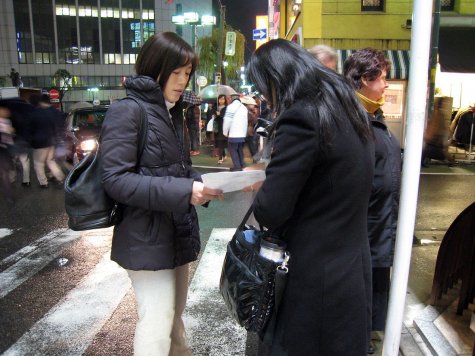After a day of meetings at the university, we took the train out to Jiyugaoka station.
Maps were consulted to figure out directions.
Up the side street, many of the storefronts in this district were closed. I noticed the bicyclist choosing the safety of sidewalk, while pedestrians casually strolled the streets.
The sidewalks were sometimes non-existent, so we had to be on alert for oncoming cars.
Around the curve, the directions led us uphill.
We found our destination, Aen, with a modest front door.
Shiomi and Satomi had a lengthy consultation with the server about a good selection of alternative dishes. The menu is complete vegetarian, but I complicate matters by trying to avoid dairy products.
The presentation was Japanese minimalist. We had egg cake with burdock.
The yam came with a sauce on the side for dipping. Various salad-type vegetables were served in smll dishes.
The sushi presentation is typical of Japan. These content was based on vegetables, without fish.
The grilled vegetables were plated with more altitude.
The vegetable stew was a contrasting texture to deep fried and cold vegetables.
We weren’t certain as to these vegetables. The seemed to be a type of root.
Our group enjoyed beverages with the meal.
Human beings typically eat three times per day. Putting constraints on the food selection presents opportunities for greater creativity.
[Start a large-image lightbox screen show over this blog post (in a supported browser)]
















